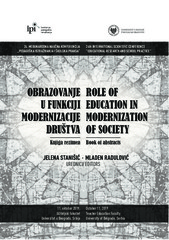Приказ основних података о документу
Nastavnici i politika celoživotnog učenja u međunarodnom i europskom kontekstu
Teachers and lifelong leraning policy in the international and european context
| dc.contributor | Stanišić, Jelena | |
| dc.contributor | Radulović, Mladen | |
| dc.creator | Lukenda, Anita | |
| dc.creator | Pavlović, Slavica | |
| dc.date.accessioned | 2021-07-26T17:11:51Z | |
| dc.date.available | 2021-07-26T17:11:51Z | |
| dc.date.issued | 2019 | |
| dc.identifier.isbn | 978-86-7447-147-0 | |
| dc.identifier.uri | http://ipir.ipisr.org.rs/handle/123456789/554 | |
| dc.description.abstract | U radu su predstavljeni rezultati kvalitativne analize i komparacije relevantnih sadržaja ključnih obrazovno-političkih dokumenata međunarodnih i evropskih organizacija (UNESCO, OECD, Savet Evrope i Evropska Unija) iz dva perioda razvoja koncepta celoživotnog učenja koji se odnose na nastavnike. Rezultati kvalitativnog istraživanja su prikazani kroz sledeće kategorije: uloga i funkcije nastavnika, selekcija budućih nastavnika, inicijalno i kontinuirano obrazovanje nastavnika, odnos nastavnik–učenik, timski rad, pomoć nastavnicima, status i uslovi rada nastavnika, istraživački rad i mobilnost nastavnika, kao i međunarodna saradnja. Analiza i komparacija sadržaja međunarodnih i evropskih dokumenata prve faze (sredina šezdesetih i kraj sedamdesetih godina 20. veka) pokazala je da dokumenti Saveta Evrope i UNESCO-a opširno i na vrlo sličan način govore o tome šta i kako treba promeniti i/ili ponovo uspostaviti kad su u pitanju nastavnici, njihova uloga, obrazovanje i položaj kako bi celoživotno učenje postalo stvarnost. Za razliku od toga, u dokumentu OECD-a nije data veća pažnja ulozi nastavnika u realizovanju celoživotnog učenja. U drugoj fazi (sredina devedesetih godina 20. veka) razvoja koncepta celoživotnog učenja dokumenti UNESCO-a i OECD-a opširno i detaljno razmatraju pitanje nastavnika, dok se u dokumentu Evropske Unije samo konstatuje da će nastavnici imati središnju ulogu u društvu koje uči. Na kraju rada je istaknuto da je analiza i upoređivanje međunarodnih i evropskih dokumenata pokazala da su nastavnici jedan od najvažnijih elemenata politike celoživotnog učenja i da je, stoga, nužno planirati i organizovati celoživotno obrazovanje i učenje nastavnika kako bi oni mogli da podstiču i osposobljavaju učenike za celoživotno učenje. | sr |
| dc.description.abstract | This paper presents results of the qualitative analysis and comparison of the content of key educational policy documents of the International and European organizations (UNESCO, OECD, Council of Europe and European Union) from two developmental stages of the lifelong learning concept with regard to the teachers. Results of the qualitative research have been presented within the following categories: role and function of teachers, selection of teacher candidates, initial and continuing training of teachers, teacher-student relation, team work, assisting teachers, status and working conditions, research and mobility of teachers and international cooperation. The analysis and comparison of the content of the International and European documents from the first phase (in the middle of 1960s and beginning of 1970s) have shown that documents of the Council of Europe and the UNESCO, to a great extent and in a similar fashion, state what should be changed and/or newly established when it comes to teachers, their role, their education as well as their status, so that lifelong learning could become reality. Compared to that, the OECD document did not pay greater attention to the role of teachers in the implementation of lifelong learning. In the second phase of development of the lifelong learning concept (in the middle of 1990s) the UNESCO and OECD documents discuss the teachers to a great extent and in detail, whereas the EU document states only that teachers will play a central role in the learning society. The paper concludes that the analysis and comparison have shown that teachers are one of the most crucial elements of the lifelong learning policy. Therefore, it is necessary to plan and organize lifelong learning and educational opportunities for teachers so that they could encourage and train their students for lifelong learning. | sr |
| dc.language.iso | sr | sr |
| dc.language.iso | en | sr |
| dc.publisher | Beograd : Institut za pedagoška istraživanja | sr |
| dc.rights | openAccess | sr |
| dc.rights.uri | https://creativecommons.org/licenses/by/4.0/ | |
| dc.source | Obrazovanje u funkciji modernizacije društva | sr |
| dc.subject | nastavnici | sr |
| dc.subject | celoživotno učenje | sr |
| dc.subject | obrazovna politika | sr |
| dc.subject | teachers | sr |
| dc.subject | lifelong learning | sr |
| dc.subject | educational policy | sr |
| dc.title | Nastavnici i politika celoživotnog učenja u međunarodnom i europskom kontekstu | sr |
| dc.title | Teachers and lifelong leraning policy in the international and european context | sr |
| dc.type | conferenceObject | sr |
| dc.rights.license | BY | sr |
| dc.citation.epage | 51 | |
| dc.citation.spage | 50 | |
| dc.description.other | Zbornik rezimea / 24. Međunarodna naučna konferencija "Pedagoška istraživanja i školska praksa | sr |
| dc.description.other | Book of abstracts / 24th International Scientific Conference "Educational Research and School Practice" | |
| dc.identifier.fulltext | http://ipir.ipisr.org.rs/bitstream/id/1649/Nastavnici_i_politika_2019.pdf | |
| dc.identifier.rcub | https://hdl.handle.net/21.15107/rcub_ipir_554 | |
| dc.type.version | publishedVersion | sr |

